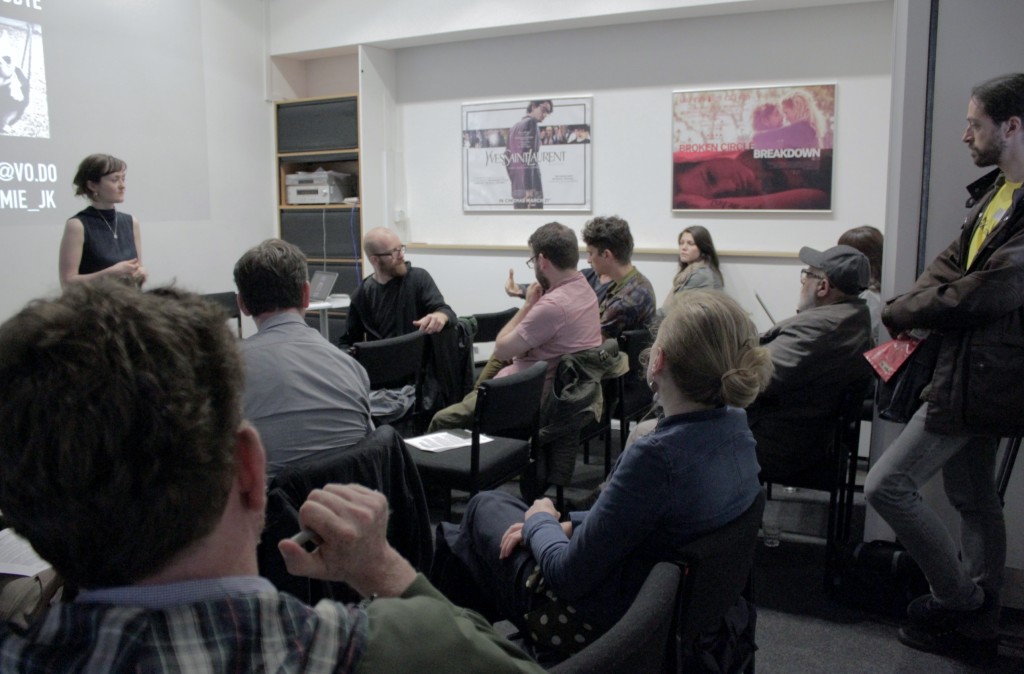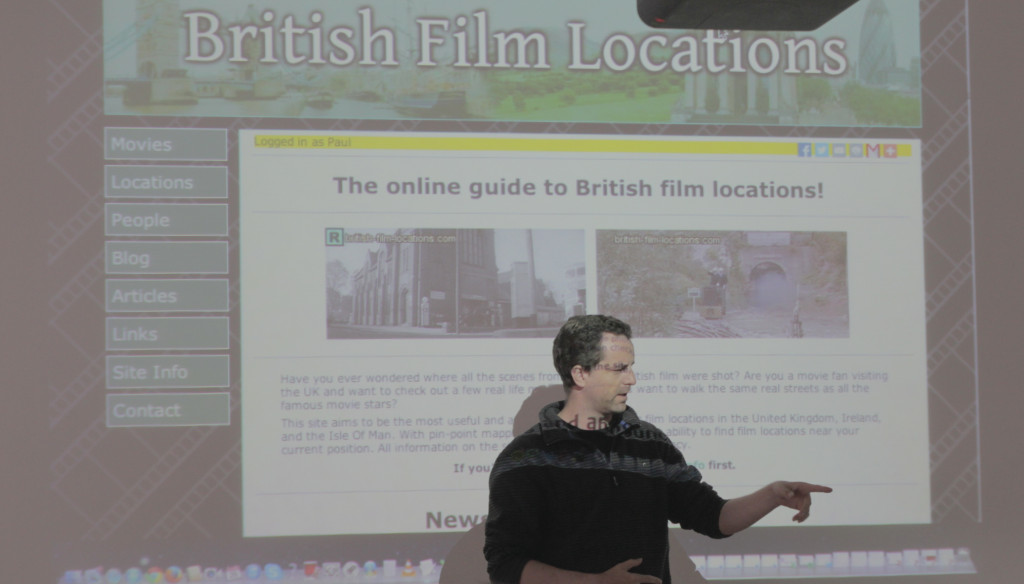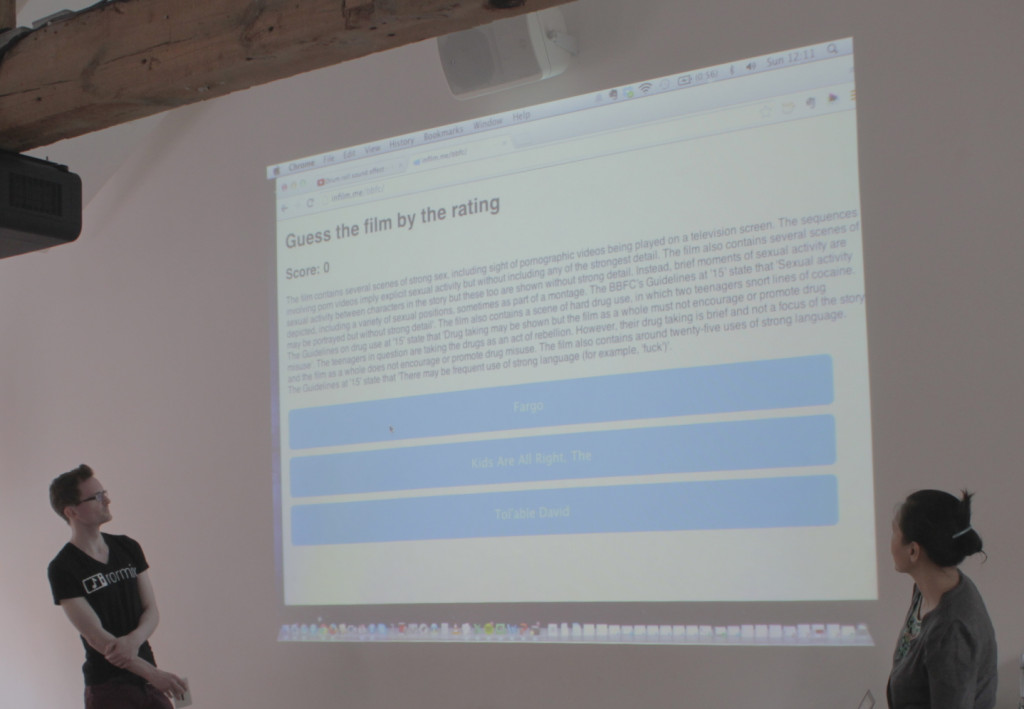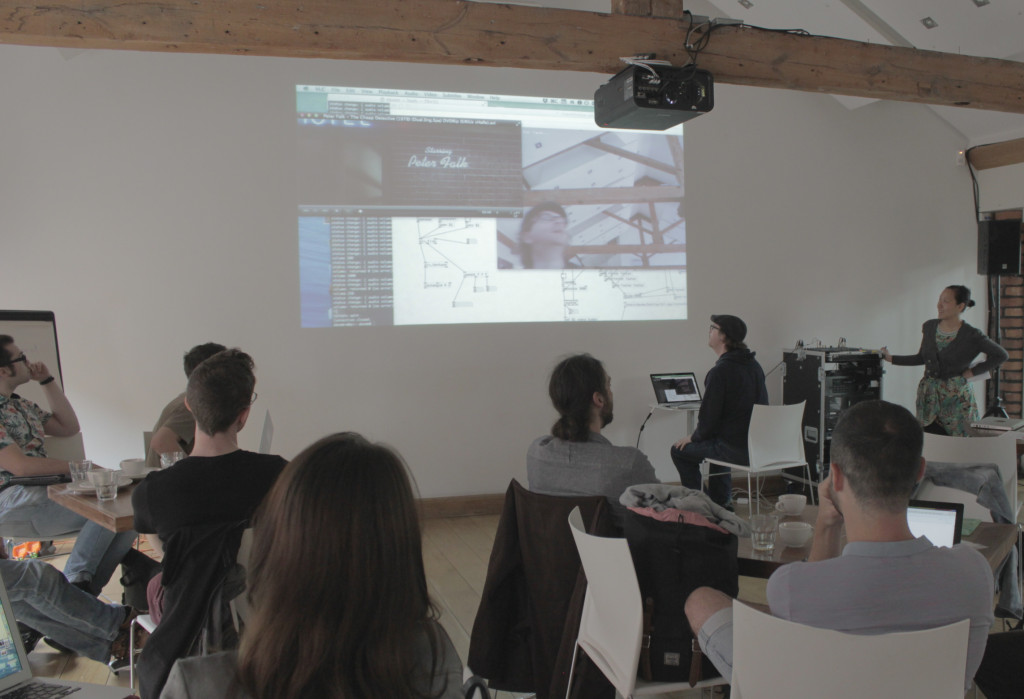AND Hack #1: Filmdata Projects
Fri 04 Jul 2014Here is a run down of the projects which were developed, tested and presented as part of our first #filmdatahack.
We’d also like to introduce you to the very talented hackers who created them, not all of which had any programming or technical know-how, but who came along with great ideas which they managed to manifest with a little support.
Many of the prototypes, from interactive games to in-progress search engines, can be accessed online and explored – so keep an eye out for the links below.
Awarded Best in Show
STREAMS is a search engine for independent film in the UK. The website will offer users simple functionality to find a film’s digital VOD cross-platform availability. If a film isn’t available, users will be able to submit a vote to liberate the film. Once a target number of votes are met, STREAMS will act a digital liberator, making these films available on VOD. It aspires to act as a stimulus for distributors of independent film, to make sure their film catalogue is available online, on at least one VOD platform
STREAMS was chosen as Best in Show by our panel of #filmdatahack judges for its feasibility, functionality, creativity and most importantly, because it champions access to specialist films. It demonstrated the potential to provide a home for ‘orphaned films’ shown at festivals but never screened again, and it could make it easier for festivals, community cinemas and pop-up events to screen independent work.
Test the prototype search engine here (currently only searches Blinkbox).
Luke Moody is the Film & Distribution Manager for Britdoc, and manages Something Real, a digital curation service for documentaries (@C4BRITDOC @SoRealToday). He created STREAMS with support from Lloyd Henning & Petter Sutton of Foxdog Studios. We will be continuing to develop STREAMS with Luke over the coming months.
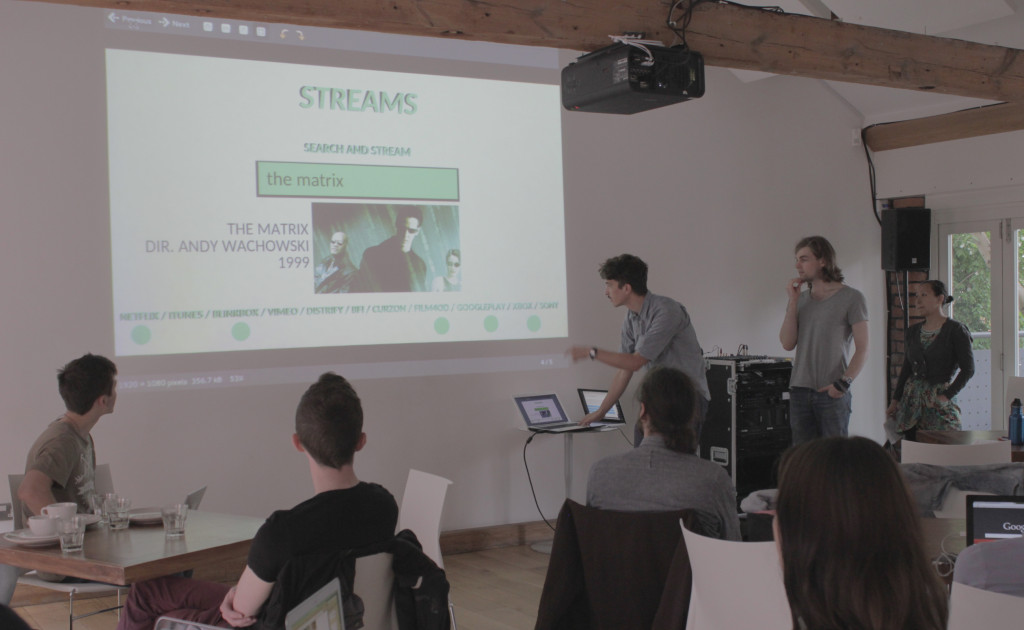
Infinite Trailer
Awarded Best Visualisation & Audience Choice
An absolute must for anyone who dared to dream that the upcoming Avengers film would feature Wolverine, a few Transformers and maybe even a guest appearance from Spock. The Infinite Trailer is a never ending action drumroll, powered by a program which automatically creates clips from trailers by snipping at fade-to-black transitions (it detects if the current frame is black). Then each clip is played randomly for you to endure, as the second meter ticks ever higher, on repeat, forever.
You may be thinking “What is the point?” but being inflicted with a stream of constant Michael Bay moments amusingly taps in to the ever growing hyberbole surrounding blockbuster film releases and the relentless campaign for audience attention as movies birth prequels, sequels and consecutive spin-offs.
The Infinite trailer was created by Marios Katsakioris, 1st year Computer Systems Engineering student at the University of Manchester, who will be contributing to the University’s Animation 14 project this summer. With support from Lloyd Henning and Peter Sutton of Foxdog Studios.
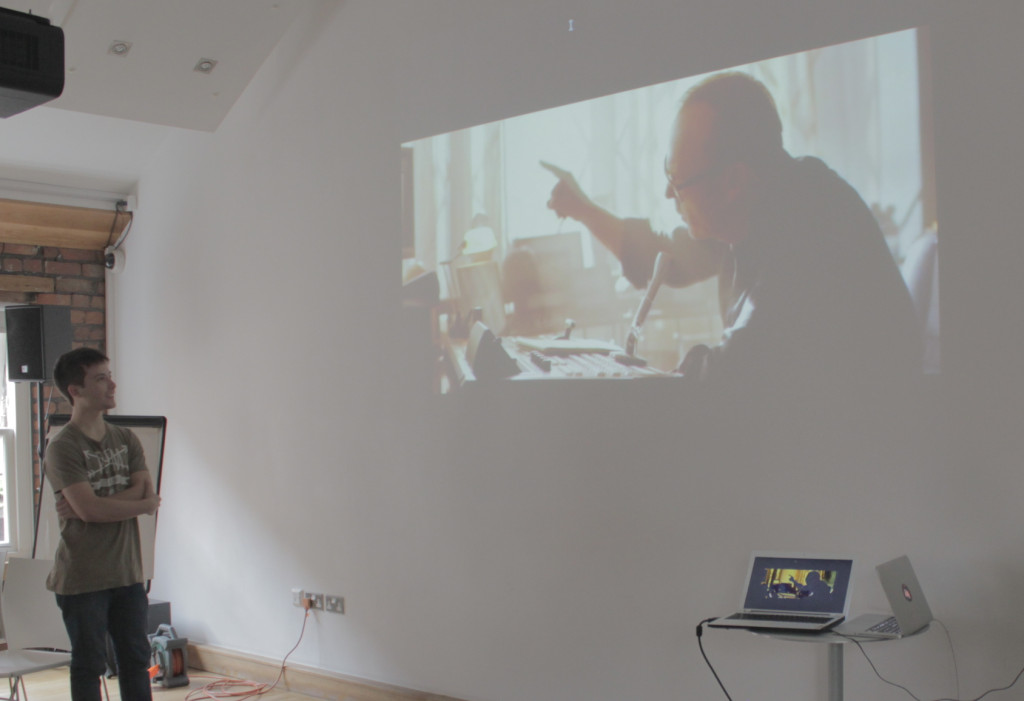
Movie Landmark Signs
Awarded Best Use of Data
This project utilised a range of data regarding filming locations across the UK and resulted in two distinct outputs, as the idea evolved beyond its original context across the #filmdatahack weekend. Initially a heat-map showing the relative density of filming locations per English county, based on location data from the IMDb, the project developed further by incorporating QR codes which linked to site specific information about famous film locations and landmarks.
We could foresee Movie Landmark Signs being utilised extensively by the tourism industry, or by film fans who wanted to draw attention to little known local sites with a rich movie history.
View the heat-maps here and here.
Movie Landmark Signs was the brainchild of web developer Paul Plowman, it feeds from his work with the British Film Locations website which he curates and manages.
This film classification quiz tasks you with guessing the movie based on the summary which decided whether it’s content is child friendly, appropriate for teenagers or should be viewed solely by legal adults (plus everything in between). Players are given a film description, three titles to choose from and have to rely on their knowledge of questionable material to win big.
Inspired by the BBFC’s description of Korean revenge tragedy ‘Oldboy’ as a film which contains scenes of “a man eating a live octopus”, the quiz challenges what we deem to be suitable for audiences and provokes us to wonder what it must be like counting the swear words in every new release.
Play Octopus here.
Octopus was created by one of the developers at Rormix.
An incredibly intuitive online multi-player film quiz, Fuiz awakens the competitive streak in the most timid of film aficionados. Each player is assigned an avatar so that they can keep track of their score and you can connect using any internet enabled electronic device. It utilises the Cornerhouse events data we provided online (prior to the Film Data Hack) to auto-generate questions, for example “Who directed film X?” or “Which year was film Y released?”. The films are also linked by title to the The Movie DB, which supplies images to vary the background for each question, making it as pretty as it is playable.
To access the demo:
– Question view fuiz.fds.im/master
– Player view fuiz.fds.im
Fuiz represents an alternative to multiplex targeted quiz apps like Cineme, demonstrating that with a little programming & data, all independent cinemas could soon be toting their very own bespoke, in-house film quiz.
Created by Peter Sutton & Lloyd Hemming of Foxdog Studios, the rock n’ roll duo of IT Consultants who supported our Film Data Hack weekend. You can connect with them on Twitter at @foxdogstudios or on Facebook.
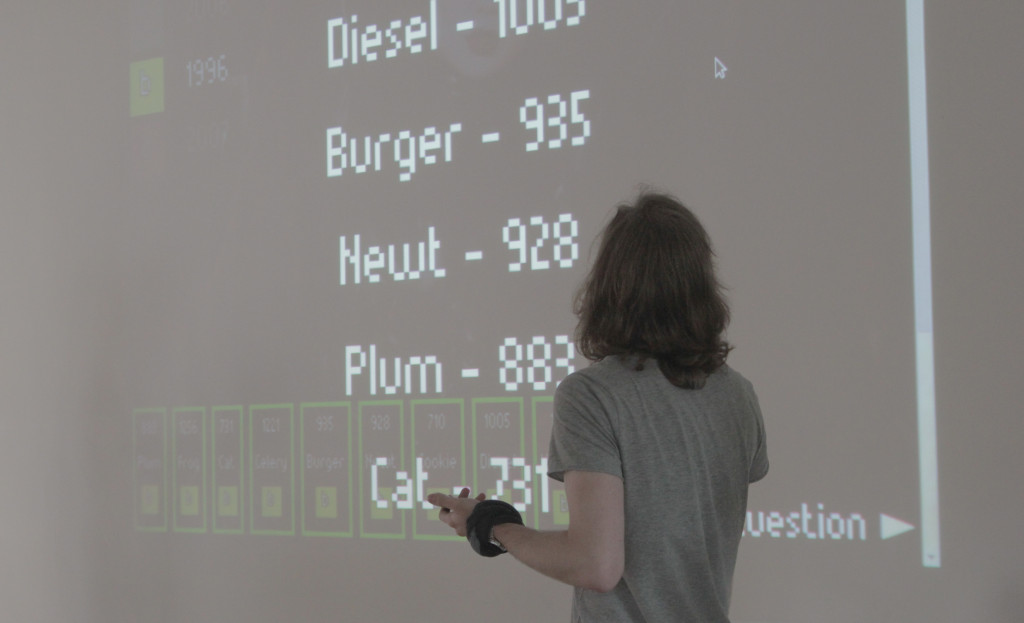
Enriched Attention Film Environment
The Enriched Attention Film Environment is here to bridge the attention gap. Using facial recognition software, it passively gathers viewing data from those watching films. The data is based on the temporal incidence of yawn-like facial expressions, the frequency of which are captured and collated, providing a metric by which films can be interpreted differently – “Transformers 3 hit a regular 3 yawns per minute!” – “The three-act model of Hollywood creates the perfect bell curve of yawn distribution!”.
Extracting data and metrics from people is an extremely questionable practice, so the system also provides useful features for viewers. Are you yawning because this is a really dull bit of film? No problem – we skip ahead ten seconds! Are you yawning because you’re tired and had a long day? No problem! We put the volume up to 300% for a few seconds, providing an auditory mechanism by which viewers can re-calibrate their attention.
Dave Mee (creative technologist and civic agitator) & Tim Brunsden (Community Filmmaker and Visual Artist) are the yawn-police who created the Enriched Attention Film Environment. The system was prototyped in PureData using FaceOSC and they are not expecting this to be funded for further development by the BFI or TSB.
Across the #filmdatahack weekend there was considerable interest in lost cinema, orphaned films and the challenges of securing film rights for the lesser known films shown at festivals. In the world where algorithms can predict audience taste and fight for your attention. This film data hack showed there is still a growing appetite for cinematic adventures not yet available on mainstream platforms or formats. Supporting distributers and venues to gain an insight into audience demand is is something we will continue to explore in other hackathons in the future.
Additional Links
- AND HACK#1: Film Data
- HACK Blog#1: Setting the Scene
- HACK Blog#2: Lightning Talks
- HACK Blog#3: The Datasets
- HACK Blog#4: Live Blog
Recent Journals
- Introducing Commons // Keiken and Jazmin Morris
- Introducing our Creative Associates programme
- Reflections on the Associate Board Member Programme
- The Future of Arts Governance
- Rendering our virtual, net and digital discourses
- Announcing a new partnership between AND and the School of Digital Arts
- Impossible Perspectives 2024
- AND’s new Board Members and Associate Board Members
- Introducing AND’s new Directors
Other Journals
-
2025
-
2024
-
2023
-
2022
-
2021
-
2020
-
2019
-
2018
-
2017
-
2016
-
2015
-
2014
-
2013
-
2012
-
2011




